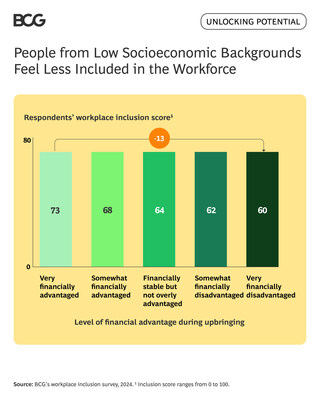People from Low Socioeconomic Backgrounds Face a Significant Barrier to Inclusion at Work
- BCG Survey of Nearly 28,000 Employees Across 16 Countries and 19 Industries Reveals Employees from Socioeconomically Disadvantaged Backgrounds Report the Lowest Sense of Belonging
- Inclusion Gap Exists Across Regions and Industries and Widens with Seniority
- Actionable Solutions Offer Companies a Competitive Edge
BOSTON, Nov. 6, 2025 /PRNewswire/ -- Employees from socioeconomically disadvantaged backgrounds experience a low level of workplace inclusion, even as their career advances and they rise through the ranks to senior leadership. This holds true across industries, job types, and regions. There are powerful business incentives to address it, however. When an inclusion gap persists, companies leave untapped potential on the table: people whose resilience, motivation, and loyalty can translate into stronger performance and retention.
These are among the findings from a new article by Boston Consulting Group (BCG), titled "Socioeconomic Status Affects the Workplace, Too: Here's How to Make Sure Everyone Succeeds."
A survey of 27,800 employees across 16 countries and 19 industries reveals that employees from financially disadvantaged backgrounds report workplace inclusion scores 13 points lower than those of their peers from financially advantaged upbringings. This gap holds true across the demographic groups in the survey and for both desk-based and nondesk-based employees.
Among the key factors contributing to lower levels of inclusion, employees from low socioeconomic backgrounds also report significantly fewer opportunities for professional growth. In comparison with their peers, the survey shows that employees from financially disadvantaged backgrounds are 38% less likely to feel they benefited from personal and professional networks, 30% less likely to develop soft skills, and 24% less likely to feel comfortable taking risks. Further, only 20% of those who grew up very financially disadvantaged said that they can be their authentic self at work, compared with more than twice as many respondents (43%) from financially advantaged backgrounds.
"Socioeconomic background shapes the experience of inclusion profoundly," says Stephen Hosie, a BCG managing director and partner, and lead author of the article. "Companies stand to benefit by expanding their inclusion strategies to recognize and address the experiences of current and prospective employees from financially disadvantaged backgrounds."
Inclusion Gap Widens with Seniority
While a sense of inclusion for most employees tends to improve with seniority, as people from low socioeconomic backgrounds rise through the ranks, the inclusion gap persists and even increases at the senior manager level. In every role, individuals from low socioeconomic backgrounds have inclusion scores that are 10 to 14 points lower than their peers who grew up very financially advantaged. This widening leaves them at a continuing disadvantage that career advancement alone doesn't close.
Benefits of Closing the Inclusion Gap
A financially disadvantaged upbringing can instill powerful strengths, and companies have much to gain by enabling employees from low socioeconomic backgrounds to succeed and show up as their authentic selves. BCG research shows that employees who feel free to be their authentic selves at work are happier, more engaged, more likely to feel heard, and nearly 2.4 times less likely to leave.
However, low levels of workplace inclusion often prevent these employees from reaching their full potential. Across every dimension of the inclusion experience, employees from low socioeconomic backgrounds report satisfaction levels that are 7 to 12 percentage points lower than their more affluent peers.
What Companies Can Do to Unlock Employees' Full Potential
In the article, BCG details how organizations can embed socioeconomic status (SES) inclusion across the employee life cycle by:
- Demonstrating leadership's commitment to SES inclusion
- Rethinking hiring practices to attract and fairly assess high-potential candidates from low socioeconomic backgrounds
- Removing barriers and putting support systems in place to promote the inclusion of employees from low socioeconomic backgrounds
"When companies overlook the impact of socioeconomic backgrounds, they're also overlooking opportunities for their workforces to reach their full potential," says Sebastian Ullrich, a BCG managing director and partner, and coauthor. "Organizations that widen their lenses to recognize and nurture this untapped talent will unlock new levels of engagement and performance and stand to gain a true competitive edge."
Download the publication here:
https://www.bcg.com/publications/2025/how-socioeconomic-status-shapes-workplace-success
Media Contact:
Eric Gregoire
+1 617 850 3783
gregoire.eric@bcg.com
About Boston Consulting Group
Boston Consulting Group partners with leaders in business and society to tackle their most important challenges and capture their greatest opportunities. BCG was the pioneer in business strategy when it was founded in 1963. Today, we work closely with clients to embrace a transformational approach aimed at benefiting all stakeholders—empowering organizations to grow, build sustainable competitive advantage, and drive positive societal impact.
Our diverse, global teams bring deep industry and functional expertise and a range of perspectives that question the status quo and spark change. BCG delivers solutions through leading-edge management consulting, technology and design, and corporate and digital ventures. We work in a uniquely collaborative model across the firm and throughout all levels of the client organization, fueled by the goal of helping our clients thrive and enabling them to make the world a better place.
![]() View original content to download multimedia:https://www.prnewswire.com/news-releases/people-from-low-socioeconomic-backgrounds-face-a-significant-barrier-to-inclusion-at-work-302606511.html
View original content to download multimedia:https://www.prnewswire.com/news-releases/people-from-low-socioeconomic-backgrounds-face-a-significant-barrier-to-inclusion-at-work-302606511.html
SOURCE Boston Consulting Group (BCG)



